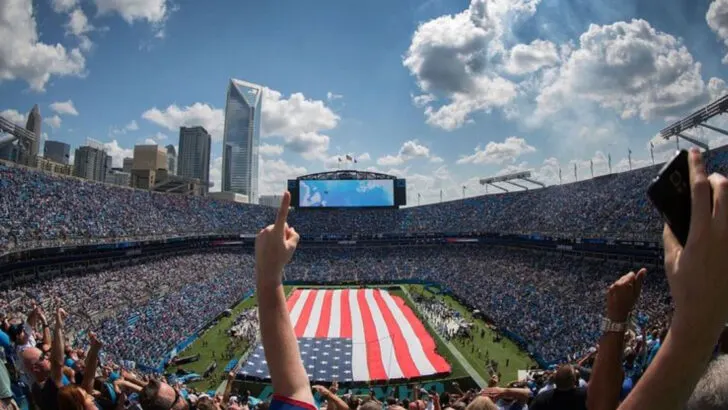Americans don’t just live big—they live loud, colorful, and unapologetically on-brand. From oversized meals to waving the Stars and Stripes at every chance, there are habits that perfectly line up with what the rest of the world expects. Step into any diner and you’ll see bottomless coffee refills and plates stacked higher than your appetite. Walk down a suburban street and you’ll spot front-yard flags, Halloween decorations in October, and Christmas lights that could land a plane in December.
Some of these quirks make people abroad laugh, others leave them shaking their heads—but all of them feel unmistakably American. Love them or tease them, these everyday habits prove that sometimes the stereotypes aren’t wrong at all—they’re just part of the charm.
Fast Food Consumption
The aroma of sizzling fries and juicy burgers defines a universal image of America. Fast food has become a staple in American culture, fueling the stereotype of the nation’s love for quick and convenient meals. It’s not just the food, but the culture of drive-thrus and 24-hour service that persists.
While the rest of the world often sees this habit as unhealthy, Americans embrace it for its speed and affordability. This obsession reflects a broader trend towards fast-paced living and instant gratification. Interestingly, the fast food industry also underscores a dynamic field for social and economic studies.
Coffee Culture
With a morning ritual that often includes a stop at the nearest café, coffee culture is deeply ingrained in American life. The image of an American clutching a large cup of coffee is iconic and often embodies the bustling, on-the-go lifestyle.
This stereotype highlights the need for convenience and energy in a fast-paced society. From specialty lattes to plain black coffee, the variety reflects the diverse preferences within the culture. Interestingly, the U.S. is one of the largest coffee consumers globally, revealing a unique social phenomenon that blends personal taste with cultural identity.
Patriotism and Flag Display
American patriotism is often visibly expressed through the display of the national flag. This stereotype is seen during national holidays, sports events, and even in everyday settings like front yards.
The flag represents pride and identity, echoing a sentiment rooted in history and tradition. This visual symbol of unity and freedom is more than just decor; it’s a statement of values and beliefs. Despite regional differences, the flag remains a unifying symbol for many, capturing a deep sense of national pride that resonates both domestically and internationally.
Large Portion Sizes
Visiting an American restaurant often reveals a common stereotype: large portion sizes. The generous servings reflect a culture that values abundance and hospitality.
While some see this as excessive, it caters to a mindset of ‘more is better,’ a belief woven into the fabric of American dining culture. This trait also emphasizes a sense of generosity and sharing, inviting debate on health and consumption patterns. The juxtaposition of portion sizes with health trends offers a fascinating insight into American life, sparking discussions both locally and abroad.
Casual Dress Code
The casual dress code is a hallmark of American life, reflecting comfort and individualism. Jeans, t-shirts, and sneakers form the quintessential wardrobe, embodying a relaxed yet confident approach to style.
This stereotype underscores a culture that prioritizes comfort and practicality over formality. While some may view it as too laid-back, it speaks to the democratic spirit and freedom of expression. The embrace of casual wear highlights a broader cultural theme of informality, resonating with a global audience and influencing fashion trends worldwide.
Obsession with Cars
In America, cars are more than just a mode of transport; they’re a symbol of freedom and independence. The open road and the classic car culture embody the adventurous spirit associated with American life.
This stereotype is fueled by vast distances and the need for personal space and mobility. Cars signify status and lifestyle, with regional preferences adding color to this narrative. From car shows to road trips, the automobile is a cultural icon, driving economic and social dynamics across the nation.
Tipping Culture
Tipping is a unique cultural practice in America, often puzzling to international visitors. It signifies appreciation for service, prevalent in restaurants, taxis, and even salons.
This practice stems from historical norms and economic structures within the service industry. While viewed as a gesture of gratitude, it also highlights wage disparities and cultural expectations. The tipping culture reflects a broader theme of personal connection and reward, adding a complex layer to American hospitality.
Love for Sports
Sports are a fundamental part of American culture, with events like the Superbowl capturing national attention. This stereotype emphasizes competitiveness and community spirit, seen in schools, neighborhoods, and professional leagues.
From baseball to basketball, the love for sports fosters unity and identity, transcending regional boundaries. It’s a cultural phenomenon that brings people together, highlighting values of teamwork and perseverance. Interestingly, sports also act as a vehicle for social change, reflecting broader societal issues and aspirations.
Halloween Celebrations
Halloween in America is more than just a holiday; it’s a cultural spectacle. The tradition of dressing up and trick-or-treating speaks to a playful and imaginative spirit.
This stereotype mirrors a love for festivities and community engagement, as neighborhoods come alive with decorations and celebrations. The roots of Halloween, steeped in history, add depth to this vibrant tradition. It’s a time when creativity and camaraderie take center stage, reflecting both individual and collective expressions of joy.
Love for the Outdoors
The great outdoors calls to many Americans, embodying a love for nature and adventure. Whether hiking, camping, or picnicking, this stereotype highlights an affinity for exploring landscapes.
This trait is rooted in historical narratives of exploration and discovery. The vast national parks and diverse geography invite a sense of freedom and connection with nature. The outdoors serves as a canvas for relaxation and adventure, painting a dynamic portrait of American life.
Consumer Culture
Consumerism is often seen as a defining characteristic of American culture, symbolized by the iconic mall experience. The stereotype reflects a society driven by choice, variety, and the pursuit of happiness through material goods.
This cultural trait reveals complex dynamics of economic growth and personal fulfillment. While criticized for promoting excess, it also underpins innovation and diversity.
The consumer culture in the U.S. provides a window into the values and aspirations that shape daily life, offering insights into the interplay between economy and identity.

